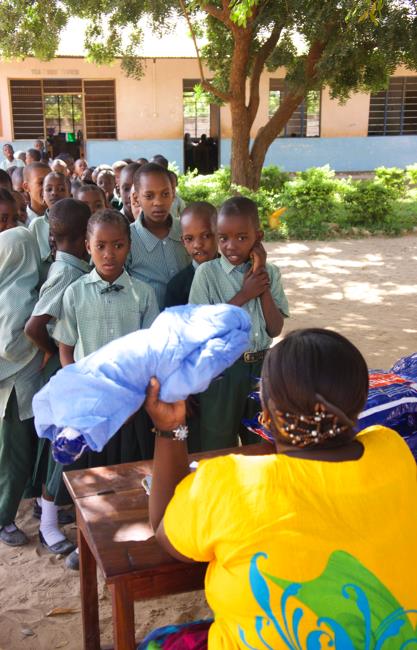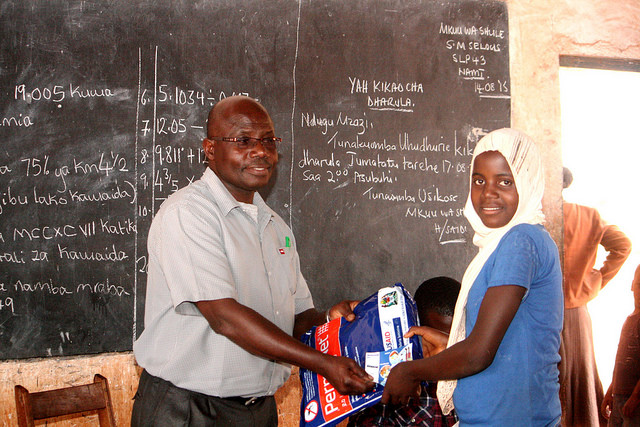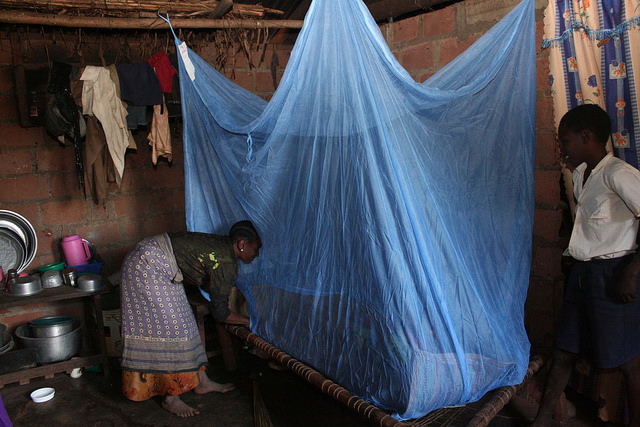
Children at Medi English Medium Primary School in Mtwara, Tanzania line up to receive their insecticide treated nets. Photo credit: Vectorworks/Claire Gillum
On Wednesday afternoon the classrooms at Medi English Medium Primary School in Mtwara, Tanzania, are usually full of activity, but on one particular Wednesday, they are empty. Instead, outside in the schoolyard, hundreds of students line up eagerly, jostling and laughing with classmates. The teachers are amazed at the crowd – they comment that some of these pupils have not attended school in weeks.
So, what is it that makes this Wednesday special? On this day the children know that there is an extra incentive to be at school: insecticide treated nets (ITNs). At Medi English Medium Primary School, this is issuing day for the third round of the annual School Net Program, a school-based ITN distribution pilot operating in three regions in Tanzania: Lindi, Mtwara, and Ruvuma.
During this round, 500,000 ITNs are being distributed to primary school children to protect them from malaria: one of the biggest killers in Tanzania. Working with the Tanzanian government, the President’s Malaria Initiative (PMI) is implementing this school-based distribution as part of a “Keep-Up” strategy designed to maintain high levels of coverage of ITNs.
In communities across Tanzania, malaria exacts a significant toll resulting in over 5,000 reported deaths per year, particularly among young children. It is one of the primary reasons for school absenteeism, often leading to failure and dropout. The children recognize the dangers of malaria in their community but, for many of their families, the cost of an ITN is simply too high. It’s for this reason that the ITNs distributed by the School Net Program are so important for thousands of Tanzanian households.
Mohamed Dadi, District Malaria Focal Person for Masasi District in Mtwara, acknowledges the crucial part that the School Net Program plays in protecting households in his district from malaria: “There are families, which have not been able to purchase nets, but with the School Net Program they now own nets.”
And, as they receive their ITNs, the children gather around, excited to explain in their own words the difference these nets make: “I like my net because I can sleep well and when I sleep well I can learn better.”
Since the start of the School Net Program in 2013 PMI in partnership with the Tanzanian Government has procured and distributed over 1.5 million ITNs to pupils in the 1st, 3rd, 4th, 5th, 7th, 9th, and 11th grades in Tanzania’s southern regions of Lindi, Mtwara and Ruvuma.

A student receives an ITN during a VectorWorks sponsored school net distribution in Namtumbo Songea, Tanzania. Copyright: 2015 Vector Works/Mark Bashagi, Courtesy of Photoshare.

At home, a mother finishes setting up an insecticide-treated bed net (ITN) for her child in Mitengo Mtwara, Tanzania.Copyright: 2015 Vector Works/Mark Bashagi, Courtesy of Photoshare.
View more photos of the School Net Distribution program in the PMI/Tanzania Flickr album.
